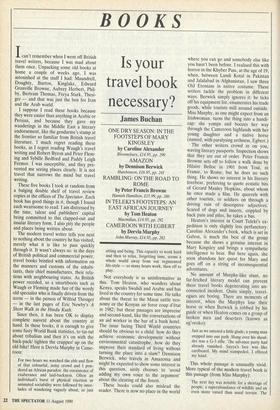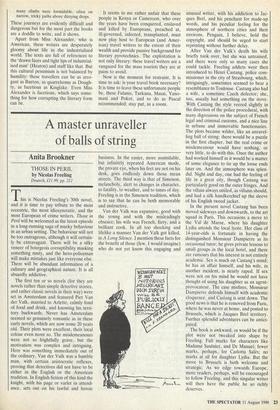BOOKS
Is your travel book necessary?
James Buchan
Ican't remember when I went off British travel writers, because I was mad about them once. Unpacking some old books at home a couple of weeks ago, I was astonished at the stuff I had: Maundrell,
Doughty, Burton, Kinglake, Edward Granville Browne, Aubrey Herbert, Phil- by, Bertram Thomas, Freya Stark, Thesi- ger — and that was just the box for Iran and the Arab world.
I suppose I read these books because they were easier than anything in Arabic or Persian, and because they gave my wanderings in the Middle East a literary endorsement, like the gendarme's stamp at the frontier so familiar from British travel literature. I much regret reading these books, as I regret reading Waugh's travel writing and Robert Byron and Peter Flem- ing and Sybille Bedford and Paddy Leigh Fermor. I was susceptible, and they pre- vented me seeing places clearly. It is not travel that narrows the mind but travel writing.
These five books I took at random from a bulging double shelf of travel review
copies at the offices of The Spectator. Each
book has good things in it, though I found each wearisome to read. I am distressed by the time, talent and publishers' capital being committed to this clapped-out and insular literary form. I also pity the people and places being written about.
The modern travel writer tells you next to nothing about the country he has visited, merely what it is like to pass quickly through it. It wasn't always so: in the days of British political and commercial power, travel books bristled with information on the manners and customs of the inhabi- tants, their chief manufactures, their rela- tions with neighbouring states. As British power receded, so a smartiboots such as Waugh or Fleming made fun of the wordy
old specialist who is finally driven from the scene — in the person of Wilfrid Thesiger — in the last pages of Eric Newby's A Short Walk in the Hindu Kush.
Since then, it has been OK to display complete naiveté about the, country at
hand. In these books, it is enough to give some fusty World Bank statistics, to tut-tut about tribalism and then it's on with the back-pack/ tighten the crupper/ up on the old bike! Here is Deryla Murphy in Came- roon:
For two hours we watched the ebb and flow of that colourful, noisy crowd and I pon- dered an African paradox: the coexistence of exuberance and laid-backness. Often an individual's burst of physical exertion or animated sociability were followed by inter- ludes of wandering vaguely about, or just sitting and being. This capacity to work hard and then to relax, forgetting time, seems a whole world away from our regimented life-style — so many hours work, then off to play.
Not everybody is as uninformative as this. Tom Heaton, who wanders about Kenya, speaks Swahili and Arabic and has lived in the country for some time. He talks about the threat to the Masai cattle eco- nomy or the Kenyan air force coup d'etat in 1982; but these passages are imprecise and second-hand, like the conversations of an aid worker in the bar of a bush hotel. The issue facing Third World countries should be obvious to a child: how do they achieve economic development without environmental catastrophe, how do they improve their standard of living without turning the place into a slum? Dennison Berwick, who travels in Amazonia and might be expected to show some interest in this question, airily chooses to 'avoid adding my own voice to the argument' about the clearing of the forest.
These books could also mislead the reader. There is now no place in the world where you can go and somebody else like you hasn't been before. I realised this with horror in the Khyber Pass, at the age of 19, when, between Landi Kota! in Pakistan and Jalalabad in Afghanistan, I saw three Old Etonians in native costume. These writers tackle the problem in different ways. Berwick simply ignores it: he ticks off his equipment list, enumerates his trade goods, while tourists mill around outside. Miss Murphy, as one might expect from an Irishwoman, turns the thing into a handi- cap: she yomps and boozes her way through the Cameroon highlands with her young daughter and a native horse (named, with paralysing archness, Egbert.) The other writers crowd in on you, waving literary passports. Inspection shows that they are out of order. Peter Francis Browne sets off to follow a walk done by Hilaire Belloc in 1901 from Toul, in France, to Rome, but he does no such thing. He shows no interest in his literary forebear, preferring to quote ecstatic bits of Gerard Manley Hopkins, about whom he once made a film. He quarrels with other tourists, or soldiers on through a driving rain of descriptive adjectives. Scared of dogs and insects, crippled by back pain and piles, he takes a bus.
Heaton's interest in Court Teleki's ex- pedition is only slightly less perfunctory. Caroline Alexander's book, which is set in Gabon, is much the best of the group because she shows a genuine interest in Mary Kingsley and brings a sympathetic intelligence to bear. But here again, she soon abandons her quest for Mary and goes off on a string of inconsequential adventures.
No amount of Murphy-like stunt, no far-fetched literary model can prevent these travel books degenerating into un- connected incident. Quite simply, travel- ogues are boring. There are moments of interest, when the Murphys lose their horse or when Berwick is robbed by his guide or when Heaton comes on a group of broken men and deserters (known as ng'oroko):
Just as we entered a little glade, a young man stepped into our path. Slung over his shoul- der was a G-3 rifle. The advance party had already vanished. Sayya's face was like cardboard. My mind stampeded. I offered my hand.
This whole passage is unusually vivid. More typical of the modern travel book is this passage (from Miss Murphy):
The next day was notable for a shortage of people, a superabundance of wildlife and an even more varied than usual terrain. The many climbs were formidable, often on narrow, tricky paths above dizzying drops.
These journeys are evidently difficult and dangerous but for the most part the books are a doddle to write, and it shows.
Apart from Miss Alexander, who is American, these writers are desperately gloomy about life in the industrialised world. The texts are full of references to the 'drawn faces and tight lips of industrial- ised man' (Heaton) and stuff like that. But this cultural pessimism is not balanced by humility: these travellers can be as arro- gant as Burton, as quarrelsome as Dough- ty, as facetious as Kinglake. Even Miss Alexander is facetious, which says some- thing for how corrupting the literary form can be. It seems to me rather unfair that these people in Kenya or Cameroon, who over the years have been conquered, enslaved and killed by Europeans, preached at, ill-governed, infected, transplanted, must now play host to European (and Amer- ican) travel writers to the extent of their wealth and provide passive background for literary pyrotechnics. The exploitation is not only literary: these travel writers are a vanguard for the mass tourists they are at pains to avoid.
Now is the moment for restraint. It is time to ask: is your travel book necessary? It is time to leave these unfortunate people be, these Fulanis, Turkana, Masai, Yano- mani and Pokot, and to do as Pascal recommended: stay put, in a room.











































 Previous page
Previous page